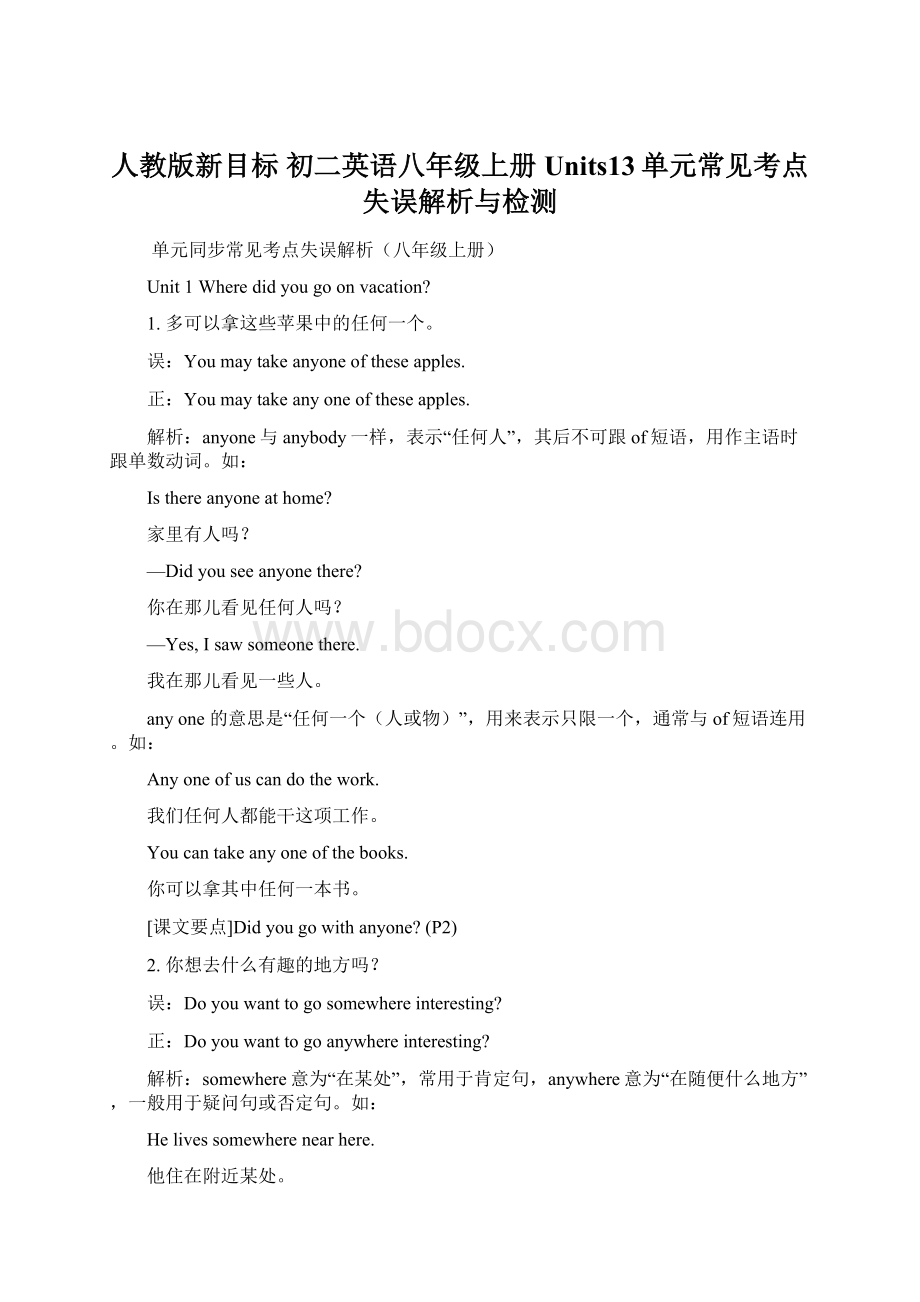 人教版新目标 初二英语八年级上册Units13单元常见考点失误解析与检测.docx
人教版新目标 初二英语八年级上册Units13单元常见考点失误解析与检测.docx
- 文档编号:5847022
- 上传时间:2023-01-01
- 格式:DOCX
- 页数:21
- 大小:49.93KB
人教版新目标 初二英语八年级上册Units13单元常见考点失误解析与检测.docx
《人教版新目标 初二英语八年级上册Units13单元常见考点失误解析与检测.docx》由会员分享,可在线阅读,更多相关《人教版新目标 初二英语八年级上册Units13单元常见考点失误解析与检测.docx(21页珍藏版)》请在冰豆网上搜索。

人教版新目标初二英语八年级上册Units13单元常见考点失误解析与检测
单元同步常见考点失误解析(八年级上册)
Unit1Wheredidyougoonvacation?
1.多可以拿这些苹果中的任何一个。
误:
Youmaytakeanyoneoftheseapples.
正:
Youmaytakeanyoneoftheseapples.
解析:
anyone与anybody一样,表示“任何人”,其后不可跟 of短语,用作主语时跟单数动词。
如:
Isthereanyoneathome?
家里有人吗?
—Didyouseeanyonethere?
你在那儿看见任何人吗?
—Yes,Isawsomeonethere.
我在那儿看见一些人。
anyone 的意思是“任何一个(人或物)”,用来表示只限一个,通常与of短语连用。
如:
Anyoneofuscandothework.
我们任何人都能干这项工作。
Youcantakeanyoneofthebooks.
你可以拿其中任何一本书。
[课文要点]Didyougowithanyone?
(P2)
2.你想去什么有趣的地方吗?
误:
Doyouwanttogosomewhereinteresting?
正:
Doyouwanttogoanywhereinteresting?
解析:
somewhere意为“在某处”,常用于肯定句,anywhere意为“在随便什么地方”,一般用于疑问句或否定句。
如:
Helivessomewherenearhere.
他住在附近某处。
Didyougoanywhereyesterday?
你昨天到什么地方去了吗?
Iamnotgoinganywheretomorrow.
明天我不想去任何地方。
[课文要点]Didyougoanywhereinteresting?
(P2)
3.由于生病,我爷爷住院了。
误:
Mygrandfatherwasinhospitalbecauseofhewasill.
正:
Mygrandfatherwasinhospitalbecauseofhisillness.
正:
Mygrandfatherwasinhospitalbecausehewasill.
解析:
becauseof表示“因为”,是介词短语,后跟名词或代词。
如:
Hewalkedslowlybecauseofhisbadleg.
他因为腿不方便而行走缓慢。
比较:
because“因为”,是连词,引导原因状语从句。
如:
It’sbesttoplanttreesinspringbecauseit’swarmer.
最好春天种树,因为天气暖和。
[课文要点]Andbecauseofthebadweather,wecouldn’tseeanythingbelow.(P5)
4.星期天我有相当多的时间做作业。
误:
IhavequiteafewtimetodomyhomeworkonSunday.
正:
IhavemuchtimetodomyhomeworkonSunday.
解析:
quiteafew意为“相当多;不少”,用于修饰可数名词复数。
time“时间”为不可数名词,应改用much或alotof。
如:
Hehasquiteafewfriends.
他有相当多的朋友。
Therearequiteafewdictionariesinthelibrary.
图书馆有相当多字典。
[课文要点]Wetookquiteafewphotosthere.(P2)
5.他是一位优秀的老师。
误:
Heisaveryexcellentteacher.
正:
Heisanexcellentteacher.
解析:
excellent意为“优秀的;极好的”,用作形容词,该词本身已含verygood之意,所以excellent前面不能再用very。
如:
That’sanexcellentfilm.
那是一部极好的电影。
[课文要点]—Dideveryonehaveagoodtime?
—Oh,yes.Everythingwasexcellent.(P3)
6.这是我自己的书。
误:
Thisismyselfbook.
正:
Thisismyownbook.
解析:
反身代词不能作定语用,要表达“自己的”这种说法时,可用“物主代词+own+名词”结构。
如:
Isthatyourownhouse?
那是你自己的房子吗?
Shemakesallherownclothes.
所有的衣服都是她自己做的。
[课文要点]Iboughtsomethingformyparents,butnothingformyself.(P3)
7.我想要喝点水。
误:
Ifeelliketodrinksomewater.
正:
Ifeellikedrinkingsomewater.
解析:
feellike意为“想要”,相当于want,语气比want婉转些,但feellike后接动词-ing形式,不能接动词不定式。
如:
Ifeellikegoingtobednow.
我现在想睡觉。
feellike还可以表示“感觉像;摸起来像”。
如:
Itfeelslikeastone.
它摸起来像块石头。
Mylegs feellike cottonwool.
我感觉两条腿像棉花一样。
Theymademe feellike oneofthefamily.
他们让我觉得就是这个家中的一员。
还可以表示“想吃或喝……”
Doyou feellike adrink?
你想喝点什么吗?
[课文要点]IfeellikeIwasabird.(P5)
8.请不要吃太多面包。
误:
Don’teattoomanybread.
正:
Don’teattoomuchbread.
解析:
many与much都可以表示“许多”的意思。
many修饰可数名词复数,much修饰不可数名词。
句中bread“面包”是不可数名词,应该用much。
如:
Youdon’thavemanyapples.
你没有许多苹果。
Ihavemuchhomeworktodotoday.
今天我有许多家庭作业要做。
[课文要点]Wewaitedoveranhourforthetrainbecausethereweretoomanypeople.(P5)
9.他的演讲单调乏味。
误:
Hisspeechesarebored.
正:
Hisspeechesareboring.
解析:
bored意为“厌倦的;烦闷的”,主语是人,通常用于描述人。
如:
Thelecturewasthreehourslongandwefeltverybored.
那堂讲座三个小时长,我们感到很厌倦。
Hewaseasilybored.
他很容易感到厌倦。
boring意为“令人厌倦的;没趣的”,主语一般是物,指事物使人感到无聊,通常用于修饰或描述物。
如:
Histalkisdeadlyboring.
他的话真是让人烦死了!
[课文要点]Stillnooneseemedtobebored.(P3)
10.为什么你一直谈论那件事?
误:
Whydoyoukeeptotalkaboutit?
正:
Whydoyoukeeptalkingaboutit?
解析:
keepdoingsomething意为“不断(一直;老是)做某事”,其中doingsomething不能改成todosomething。
如:
Itkeptrainingforthreedays.
连接下了三天的雨。
[课文要点]Myclassmatestoldmetokeepgoing,soIwenton.(P8)
11.我们决定不玩 电脑游戏了。
误:
Wedecidednotplaycomputergames.
正:
Wedecidednottoplaycomputergames.
解析:
decide是及物动词,后跟名词、代词或带to的动词不定式作宾语。
不定式的否定结构为nottodosomething。
如:
Idecidedtotellheraboutit.
我决定要告诉她那件事。
TheydecidednottogotoBeijingthenextday.
他们决定第二天不去北京。
[课文要点]Itwassunnyandhot,sowedecidedtogotothebeachnearourhotel.(P5)
12.我喜欢晚饭后散步。
误:
Ienjoytotakeawalkaftersupper.
正:
Ienjoytakingawalkaftersupper.
解析:
enjoy意为“喜欢”,是及物动词,后跟名词、代词或动词-ing形式作宾语,不可以接动词不定式作宾语。
如:
Ienjoyreadingnovels.
我喜欢读小说。
Thechildrenenjoywatchingafootballmatch.
孩子们喜欢看足球比赛。
[课文要点]Ireallyenjoyedwalkingaroundthetown.(P5)
13.他们昨天到达纽约。
误:
TheyarrivedNewYorkyesterday.
正:
TheyarrivedinNewYorkyesterday.
解析:
arrive是不及物动词,通常接介词at(一般用于较小的地方)或in(一般用于较大的地方).如:
Wearrivedatthestationfiveminuteslate.
我们到车站晚了5分钟。
TheywillarriveinParisnextMonday.
他们将于下周星期一到达巴黎。
表示“到达”还可以用get和reach。
get也是不及物动词,较口语化,接宾语时,须跟介词to。
如:
Whendidyougettothevillageyesterday?
你们什么时候到达村庄的?
Whenwegottothepark,itbegantorain.
我们到达公园时,就开始下雨了。
arrive与get都可以直接跟here,there,home之类的表地点的副词作状语。
如:
Whattimedoesthetrainarrivethere?
火车什么时候到那里?
Wegotherelastnight.
我们昨晚到达这儿。
reach通常是及物动词(较get更正式),其后可直接跟地点名词作宾语(不能用介词)。
如:
HereachedBeijingyesterday.
他昨天到达北京。
注:
reach之后也可接here,there,home等词。
Whendidhereachhomeyesterday?
昨天他什么时候到家?
[课文要点]IarrivedinPenanginMalaysiathismorningwithmyfamily.(P5)
14.多么糟糕的天气啊!
误:
Whatabadweatheritis!
正:
Whatbadweatheritis!
解析:
weather意为“天气”,是不可数名词,不可以与a连用。
如:
Iweararaincoatinwetweather.
雨天我穿雨衣。
如果表示特指某地区的天气,可以加定冠词。
如:
Theweatherinmyhometownisverycoldinwinter.冬天我家乡的天气很冷。
[课文要点]TheweatherwashotandsunnyonMonday,sowentparaglidingonthebeach.(P6)
15.请把字典带到图书馆去。
误:
Pleasebringthedictionarytothelibrary.
正:
Pleasetakethedictionarytothelibrary.
解析:
take和bring都有“拿”和“带”的意思。
一般来说,bring表示把东西拿到说话人所说话的地方,是“拿来”,“带来”的意思。
而take则是把东西拿到离开说话人所说话的地方。
表示“拿走”或“带走”。
如:
A:
Where’syourhomework,WangMing?
王明,你的作业在那儿?
B:
Sorry,Ileftitathome.
对不起,我留在家里了。
A:
Bringitheretomorrow.
明天把它带来。
B:
OK.
好的。
A:
Bytheway,whosechairisit?
顺便问一下,这是谁的椅子?
B:
Ourteacher's.
我们老师的。
A:
Pleasehelpmetakeittotheteacher’soffice.
请帮忙把它带到老师办公室去。
B:
Allright. 好的。
takesomethingwithsomebody表示“随身带走某物”,bringsomethingwithsomebody.则表示随身带来某物;takesomethingaway表示“拿走某物”。
试比较:
Itisgoingtorain;pleasetakeyourraincoatwithyou.
快下雨了,请随身带雨衣。
Whenyoucomeherenexttime,pleasebringtheraincoatwithyou.
下次你来这儿的时候,请带雨衣来。
Pleasetaketheemptyboxaway.
请把箱子拿走。
[课文要点]
Wealsodidn’tbringenoughmoney,soweonlyhadonebowlofriceandsomefish.(P6)
16.—别忘了做家庭作业。
—好的。
我立刻就做。
误:
—Don’tforgetdoingyourhomework.
—OK.Iwilldoitrightnow.
正:
—Don’tforgettodoyourhomework.
—OK.Iwilldoitrightnow.
解析:
forget doing意为“ 忘记做过某事”(已做);forget to do“ 忘记要去做某事”(未做)。
如:
The light in the office is still on. He forgot to turn it off.
办公室的灯还在亮着,它忘记关了。
(没有做关灯的动作)
He forgot turning the light off.
他忘记他已经关了灯了。
( 已做过关灯的动作)
Don't forget to come tomorrow.
别忘了明天来。
(to come动作未做)
[课文要点]Wewaitedalongtimeforthetrainandwewerewetandcoldbecauseweforgottobringanumbrella.(P6)
17.—再吃两个苹果好吗?
—谢谢。
我已经吃够了。
误:
—Wouldyouliketohaveothertwoapples?
—No,thankyou.I’vehadenough.
正:
—Wouldyouliketohaveanothertwoapples?
—No,thankyou.I’vehadenough.
解析:
anothertwoapples意为“另外两个苹果”,是“another+基数词+可数名词复数”结构,相当于“基数词+more+可数名词复数”。
如:
Weneedanotherfivestudentstohelpus.(=Weneedfivemorestudentstohelpus.
我们还需要五名学生帮助我们。
[课文要点]Thenwewalkedforanothertwohoursbeforewegottothetop.(P6)
[自我检测]
单项填空:
1.IhavethreeEnglishdictionaries,youcantake_______ofthem.
A.anyoneB.someoneC.someoneD.anyone
2.Heseldomwent________excepttohisoffice.
A.nowhereB.anywhereC.everywhereD.somewhere
3.—Didyouhaveasportsmeetingyesterday?
—No,wedidn’t.Itwasputoff______theheavyrain.
A.insteadofB.becauseofC.asforD.acrossfrom
4.Itisraininghardnow;________ofthestudentswerelateforschool.
A.alittleB.littleC.quiteafewD.few
5.The band played ________music atthe children's show.
A.aexcellentB.verywellC.veryexcellent D.excellent
6.MywifedecidedIshouldhave________shop.
A.myselfB.myselfownC.myownD.herself
7.—Wouldyouliketohavesomefruit?
—No,thanks.Idon’tfeellike______anythingnow.
A.eatB.eatingC.toeatD.ate
8.Thereisn’t_______waterinthebigglass.
A.manyB.muchC.alotD.plenty
9.Nancyfeels________becauseeverydayshedoesthesamethings.
A.relaxingB.relaxedC.boringD.bored
10.Formanyyearshehaskept________tous.
A.writeB.towriteC.wroteD.writing
11.Susandoesn'tlikesports,soshehasdecidedtheP.E.club.
A.tojoinB.don'tjoinC.nottojoinD.join
12.Weknowthatsheenjoys________booksverymuch.
A.readB.readsC.readingD.toread
13.Don’tforgettowritetomeassoonasyou_______Australia.
A.arriveB.arriveinC.reachD.get
14.It’ssuch______fineweatherthatwearegoingtoswimintheriverthisafternoon.
A.theB./C.anD.a
15.Ifthepostmanhasaregisteredletterforus,he________ittoourflat.
A.bringsB.spendC.leavesD.take
16.—The light in the office is still on.
—Oh,I forgot_________.
A. turning it off B. turn it off C. to turn it off D. having turned it off
Unit2Howoftendoyouexercise?
1.我几乎不会说英语。
误:
IcannothardlyspeakEnglish
正:
IcanhardlyspeakEnglish
解析:
hardly是副词,含有否定意义,所以误句中的cannothardly要改成canhardly。
can与ever连用,意为“几乎从来不”、“很少”;与can连用,意为“几乎不能(会)”,与any或anything连用,意为“几乎没有”。
如:
Wehardlyeverseehimthesedays.
近来我们很少看见他。
IcanhardlyspeakEnglish
我几乎不会说英语。
Helearnthardlyanythinglastterm.
上学期他几乎没有学到什么东西。
[课文要点]HehardlyeverwatchesTV.(P12)
2.看太多电视对你眼睛没有好处。
误:
WatchingTVtoomuchisnotgoodtoyoureyes.
正:
WatchingTVtoomuchisnotgoodforyoureyes.
解析:
begoodto意为“对……友好”。
如:
Theteachersherearegoodtous.
这里的老师待我们很好。
- 配套讲稿:
如PPT文件的首页显示word图标,表示该PPT已包含配套word讲稿。双击word图标可打开word文档。
- 特殊限制:
部分文档作品中含有的国旗、国徽等图片,仅作为作品整体效果示例展示,禁止商用。设计者仅对作品中独创性部分享有著作权。
- 关 键 词:
- 人教版新目标 初二英语八年级上册Units13单元常见考点失误解析与检测 人教版 新目标 初二 英语 年级 上册 Units13 单元 常见 考点 失误 解析 检测
 冰豆网所有资源均是用户自行上传分享,仅供网友学习交流,未经上传用户书面授权,请勿作他用。
冰豆网所有资源均是用户自行上传分享,仅供网友学习交流,未经上传用户书面授权,请勿作他用。


 铝散热器项目年度预算报告.docx
铝散热器项目年度预算报告.docx
